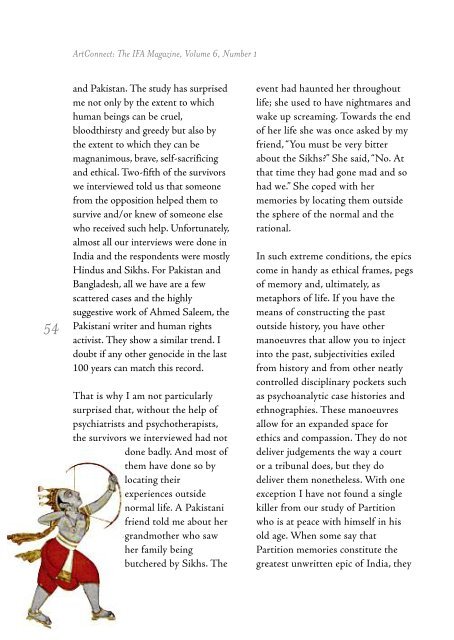Layout 3 - India Foundation for the Arts - IFA
Layout 3 - India Foundation for the Arts - IFA
Layout 3 - India Foundation for the Arts - IFA
Create successful ePaper yourself
Turn your PDF publications into a flip-book with our unique Google optimized e-Paper software.
54<br />
ArtConnect: The <strong>IFA</strong> Magazine, Volume 6, Number 1<br />
and Pakistan. The study has surprised<br />
me not only by <strong>the</strong> extent to which<br />
human beings can be cruel,<br />
bloodthirsty and greedy but also by<br />
<strong>the</strong> extent to which <strong>the</strong>y can be<br />
magnanimous, brave, self-sacrificing<br />
and ethical. Two-fifth of <strong>the</strong> survivors<br />
we interviewed told us that someone<br />
from <strong>the</strong> opposition helped <strong>the</strong>m to<br />
survive and/or knew of someone else<br />
who received such help. Un<strong>for</strong>tunately,<br />
almost all our interviews were done in<br />
<strong>India</strong> and <strong>the</strong> respondents were mostly<br />
Hindus and Sikhs. For Pakistan and<br />
Bangladesh, all we have are a few<br />
scattered cases and <strong>the</strong> highly<br />
suggestive work of Ahmed Saleem, <strong>the</strong><br />
Pakistani writer and human rights<br />
activist. They show a similar trend. I<br />
doubt if any o<strong>the</strong>r genocide in <strong>the</strong> last<br />
100 years can match this record.<br />
That is why I am not particularly<br />
surprised that, without <strong>the</strong> help of<br />
psychiatrists and psycho<strong>the</strong>rapists,<br />
<strong>the</strong> survivors we interviewed had not<br />
done badly. And most of<br />
<strong>the</strong>m have done so by<br />
locating <strong>the</strong>ir<br />
experiences outside<br />
normal life. A Pakistani<br />
friend told me about her<br />
grandmo<strong>the</strong>r who saw<br />
her family being<br />
butchered by Sikhs. The<br />
event had haunted her throughout<br />
life; she used to have nightmares and<br />
wake up screaming. Towards <strong>the</strong> end<br />
of her life she was once asked by my<br />
friend, “You must be very bitter<br />
about <strong>the</strong> Sikhs?” She said, “No. At<br />
that time <strong>the</strong>y had gone mad and so<br />
had we.” She coped with her<br />
memories by locating <strong>the</strong>m outside<br />
<strong>the</strong> sphere of <strong>the</strong> normal and <strong>the</strong><br />
rational.<br />
In such extreme conditions, <strong>the</strong> epics<br />
come in handy as ethical frames, pegs<br />
of memory and, ultimately, as<br />
metaphors of life. If you have <strong>the</strong><br />
means of constructing <strong>the</strong> past<br />
outside history, you have o<strong>the</strong>r<br />
manoeuvres that allow you to inject<br />
into <strong>the</strong> past, subjectivities exiled<br />
from history and from o<strong>the</strong>r neatly<br />
controlled disciplinary pockets such<br />
as psychoanalytic case histories and<br />
ethnographies. These manoeuvres<br />
allow <strong>for</strong> an expanded space <strong>for</strong><br />
ethics and compassion. They do not<br />
deliver judgements <strong>the</strong> way a court<br />
or a tribunal does, but <strong>the</strong>y do<br />
deliver <strong>the</strong>m none<strong>the</strong>less. With one<br />
exception I have not found a single<br />
killer from our study of Partition<br />
who is at peace with himself in his<br />
old age. When some say that<br />
Partition memories constitute <strong>the</strong><br />
greatest unwritten epic of <strong>India</strong>, <strong>the</strong>y


